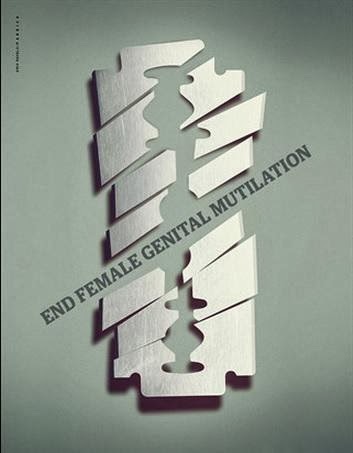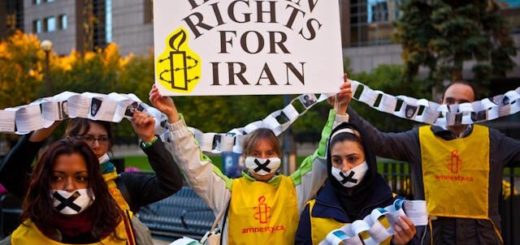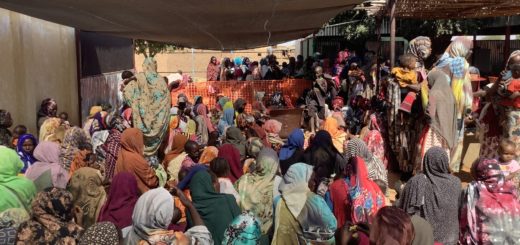End Famale Genital Mutilation
che ringraziamo sempre molto.
Ravelo è un artista cubano diventato famoso per alcune campagne
pubblicitarie
come Unhate,
progettata per Benetton, fotomontaggi fantapolitici tra leader che si
baciano (questo ha destato particolare scalpore…);
Fahma
Mohammed è invece una studentessa somala di Bristol di 17 anni che
ha lanciato tramite Change.org una petizione ripresa poi dal “The
Guardian” per azioni capillari di sensibilizzazione nelle scuole
britanniche sulle mutilazioni genitali femminili. Secondo gli
ultimi dati OMS questa pratica colpisce ancora più di 130 milioni di
bambine nel mondo: nel solo Regno Unito, nonostante sia illegale dal
1985, si
calcola che ogni anno vengano infibulate o escisse circa 66.000
bambine e ragazze e ce ne siano più di 20.000 “a rischio”.
Erik ha voluto dare il
suo contributo a questa campagna creando il logo presentato lo scorso
fine settimana: una lametta arrugginita e affilata che evoca
l’inequivocabile ma rotta, quindi inutilizzabile e per di più
trafitta in diagonale dallo slogan della campagna: “End Female
Genital Mutilation”.
Ed ecco il testo della
petizione (che si può ancora firmare) a Micheal Gove sottosegretario
britannico all’educazione per formare insegnanti sul tema delle MGF
prima dell’estate, “la stagione del taglio” quando
approfittando delle vacanze scolastiche, molte ragazze vengono
rimandate nei Paesi d’origine per essere sottoposte a questo rito
che le priva del piacere sessuale e le condanna al dolore e a
continue infezioni.
Warning:
This petition is about FGM and may be distressing for some
readers.
You
wouldn’t think school girls in the UK have to worry about female
genital mutilation (FGM), but we do. Although it is illegal in the
UK, it is still happening – 24,000 girls in the UK are currently at
risk of FGM. People just don’t talk about it, doctors don’t check for
it and teachers don’t teach it.
is child abuse.
It forces girls into a future of pain from the moment they are cut.
They face the risk of infertility, pain during urination,
menstruation, childbirth and sexual intercourse. The pain doesn’t
go. It’s
a traumatic experience they have to live with every single day,
physically and emotionally.
why I’ve started this campaign with The Guardian.
I
know of people who have been cut – anyone who knows girls from FGM
affected communities will know girls who have been cut. We were told
Ofsted would be asking schools what they are doing to protect these
girls from FGM, but it never happened.
and my classmates campaigned for our school to do more on FGM. Now
all the girls at school know the risks of FGM and feel able to talk
about it.
But this is one school. We need this to happen at every school in the
country – so that no girl is missed.
need to act now. Many girls are sent away to be cut over the summer
holidays. Some are cut at home. They
call it the ‘cutting season’.
If every headteacher was given the information they need to talk
about FGM to students and parents we could reach every girl who is at
risk before the holidays. We could convince families not to send
their daughters to be cut and we can help girls who are at risk. We
could break the cycle so the next generation is safe.
calling for Michael Gove to get schools to teach about FGM before the
summer holidays.
Gove — we’re serious, we’re not going to back down and we won’t
go away.


















